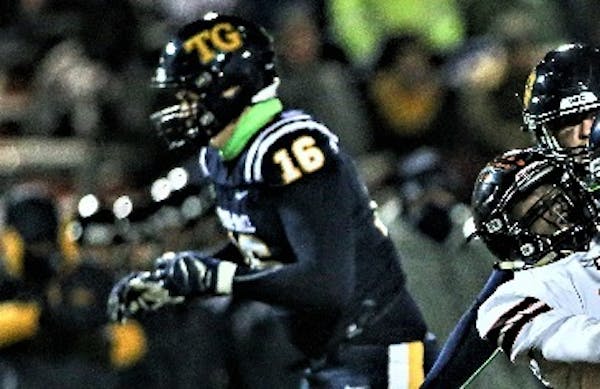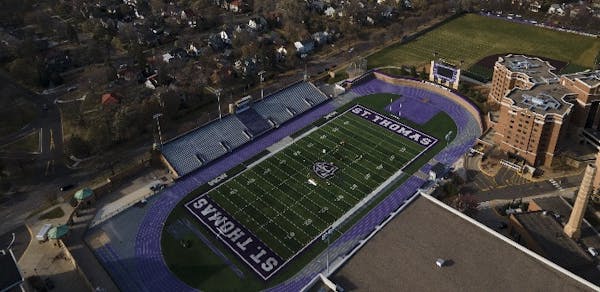Jordan Titus and Savion Robinson didn't exactly become tight growing up playing youth football in St. Paul. But they played against each other often enough that a friendship evolved around their love for the game.
"We competed against each other all through youth football," recalled Titus, a stalwart senior two-way lineman at Hutchinson. "He played for West Side Boosters. I played for Frogtown. We actually played each other for the league championship in eighth grade."
Titus left St. Paul before his freshman year when his father's job mandated a move to Hutchinson. Playing in that football-mad community, Titus parlayed his 6-1, 285-pound physique and uncommon explosiveness into a sterling high school career and collegiate opportunities from such programs as Minnesota State Mankato, Minnesota Duluth and Sioux Falls.
Robinson, a product of the youth organization that spawned Jalen Suggs, Terry Lockett and Kaden Johnson, followed their path to Minnehaha Academy. A fleet-of-foot wide receiver, Robinson, playing for SMB, caught the game-winning touchdown pass in the 2019 Class 4A state semifinals, lifting the Wolfpack over Titus' Hutchinson team.
"I talked to him after the game," Robinson said, adding with a laugh, "He never tackled me, though. That would have hurt."
Robinson, too, garnered more than a few offers to play college football after high school, from Division I FCS schools such as North Dakota and South Dakota State and Division II Minnesota Duluth, Bemidji State and the University of Mary (N.D.).
But for both, one name jumped out as they pondered their college futures:
The University of St. Thomas, set to become the second Division I football program in the state.
The 9,000-plus student institution is taking part in its first early signing period starting Wednesday as it makes an unprecedented jump from Division III to Division I football in 2021. The move comes after more than 115 years of football history and establishing itself as a dominant program in the MIAC for the past decade.
Being part of the transition and history has captivated many local recruits, including Titus and Robinson. Rivals for most of their lives, the two are among at least 11 Minnesotans who have committed to St. Thomas for the upcoming school year.
"My heart is in St. Paul," Titus said. "A majority of my family is still there. They've always had a strong program and you could feel the culture and what they're trying to do. It's a program making a big jump, and I want to be part of that."
Titus jumped at the chance first, then encouraged his old St. Paul rival to follow suit. Robinson didn't take much persuading.
"I liked the environment and it was close to home, so my family can come watch me play," said Robinson, who will be moving to defensive back. "When they offered me, he was like 'Bro, you've got to come. It's our dream since we were kids.' I think we might even room together."
They'll join a program that, under coach Glenn Caruso, has adapted the approach that elevated St. Thomas to one of national significance at the Division III level.
"A lot of people say it's an enormous jump to make, but it's really just a continuation of what we started to build here 12 years ago," Caruso said. "Sure, football gets them here, but it's not just evaluating film on 627 kids. It's really more getting to know the young man and what drives home, what are his needs and do we fill them?"
Just because St. Thomas will be classified as Division I doesn't mean the Tommies are the equivalent of your standard D-I program. They will be members of the Pioneer League, an 11-member conference of mostly private schools with a nationwide footprint from California (University of San Diego) to Florida (Stetson) to New York (Marist). Like Ivy League schools, Pioneer League teams do not offer athletic scholarships. St. Thomas, which runs about $53,000 per year for room, board and tuition, has to find another selling point.
Academics.
Totino-Grace senior Kristoff Kowalkowski entered the fall season with at least two Division I offers — from Florida Atlantic and Central Michigan — and a number of Ivy League schools in the mix as well.
None offered the dual advantages of playing close to home and preparing for a future as a doctor that St. Thomas did. Ultimately, Kowalkowski said, the decision was obvious.
"It was just a great fit for me," he said. "And it's chance to be a part of history. I could see myself thriving there."
Robinson said his desire for a future in criminology sealed his choice.
"It was really about what I want to do in life beyond football," he said. "It's the opportunities this will give me."
Kowalkowski said recruits have talked among themselves about some of the other benefits of life as a Division I athlete, calling the broad geographic scope of the league "another cool thing."
"One week you might be in New York, another it might be San Diego,'' he said. "That's pretty special."
Oliver West, who covers Minnesota high school football recruiting for Prep RedZone, an online football website, said being a part of a historic first coupled with the success Caruso and his staff have had at St. Thomas make for an inviting proposition for local recruits.
"Kids from Minnesota know the kind of success St. Thomas has had, so even if they were still [Division] III, they would listen to what Caruso has to say," West said. "They should be able to have some success right away in the Pioneer League. It's got a lot of kids excited."
Said Titus: "I've talked to a lot of in-state recruits and they all have the same mind-set: Who doesn't want to stay home and still play D-I football for a school like St. Thomas? It's pretty much a win-win."

Twins lose second in a row to Blue Jays as bullpen falters late

The PWHL's growth comes with a price for a Minnesota Frost team building a potential dynasty
What is the 'House settlement,' and what does it mean for the Gophers and NCAA?

Souhan: Anxiety and depression in the NFL helped inspire Lindsey Young's children's book


